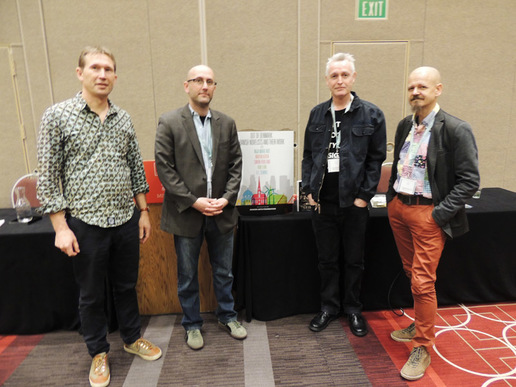 "Out of Denmark" l-r: Fruelund, Semmel, Aiken, Leine "Out of Denmark" l-r: Fruelund, Semmel, Aiken, Leine With around 530 panels at the AWP writers conference, recently concluded last weekend in Minneapolis, it’s not difficult to find sessions that mirror one's interests. For instance, I’m writing a novel based in the Iraq War. Not only did I find one that explored war, I found seven and made it to four. However, was I willing to explore areas that didn’t presently touch my life? Perhaps the most esoteric panel I attended was “Out of Denmark: Danish Novelists and Their Work.” Beyond Isak Dinesen’s Out of Africa and Peter Hoeg’s Smilla’s Sense of Snow, I didn’t know much about Danish literature other than an awareness that Danish detective fiction had a good following. In fact, last year I’d picked up a copy of Copenhagen Noir edited by Bo Tao Michaelis, but hadn’t read it yet. Knowing I’d be travelling to Denmark this summer, I sought out this panel and was rewarded. The panel featured two Danish novelists, Simon Fruelund and Kim Leine, and two translators, Martin Aitken and Kyle Semmel. As moderator, Semmel explained how Denmark is a small country, and its writers are a small community, even if some of them work in obscurity until they make it internationally. When Aitken translated Dorthe Nors’ Karate Chop, she wasn’t known—and then the story collection brought her recognition first internationally and then back home. Even though there were only two writers on the panel, I came away with a sense of the breadth of contemporary Danish fiction. Leine, for instance, won the Nordic Council Literature Prize for The Prophets of Eternal Fjord, an epic tale about a newly ordained Danish priest, Morten Falck, who travels to Greenland in 1787 to convert the Inuit to Lutheranism. There’s a collision between the Greenlandic and the Danish cultures. It will be published in translation in the U.S. in July. To get a sense of the sound and rhythm of his work, Leine read short passages in Danish, then his translator, Martin Aitken, read the same passage in English. Aiken said he translates with music in mind. He tries to capture the poetry of the book. In Leine’s voice, the sense of older Danish had to be carried over in English. “The main thing was the feel of the piece,” Aiken said. While I had my doubts about a story set in 1787 Greenland, they quickly vanished when Aitken read, offering a life-and-death situation set on a high cliff above the water. It reminded me how I fell into James Clavell’s Shogun, which was 17th-century Japan. Fruelund read in English from his newest book, Civil Twilight. It’s probably at the other end of the spectrum from Leine’s novel. Rather than traditional storytelling on an epic scale, this novella offers vignettes of people living on a single street near Copenhagen in the 21st century, and the snapshots of these people build on each other to reveal, as translator Semmel says, “that sections interlock, like pieces in a jigsaw puzzle.” As Semmel states in the foreword to the book, “You will not find a single word to clog the gears. He takes great care with his language, crafting it with precision, and his creations are the literary equivalent of Danish Design: smooth, clean, “minimalist” constructs that are built to last.” Fruelund said Carver and Hemingway had influenced him, and that to be a Danish writer, he had to consider “provincial vs. international. The Danish writer has to have this in mind.” In all, I left even more curious about Danish writing and will read more. This idea of pushing your sense of curiosity, by the way, is mirrored by film producer Brian Grazer, whose new book A Curious Mind: The Secret to a Bigger Life, explores how to keep open to new things. He says part of the challenge is you’re in a situation where people are superior to you in a certain area, and you have to be comfortable with that. In college, students accept it naturally, but older adults often don’t like to feel inferior. You have to get over that. Says Grazer, “Curiosity has never let me down—just the opposite. The only questions I regret are the ones not asked.” You can read the Los Angeles Times’ story on him by clicking here.
1 Comment
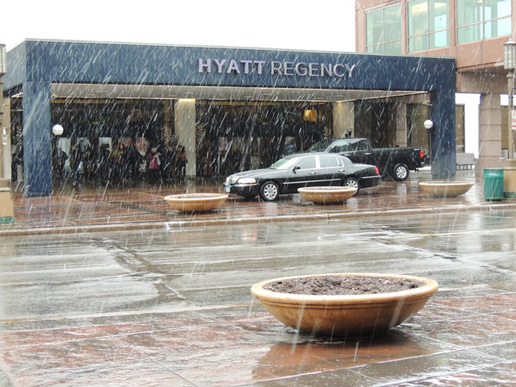 It snowed briefly over two days at the AWP Conference. Most members were inside at panels. It snowed briefly over two days at the AWP Conference. Most members were inside at panels. Now that I’m back in Los Angeles from Minneapolis, I can consider more of what I’d taken in. Among over 180 panels offered at the AWP Writers Conference on the first day, I managed to make it to four. Three had to do with trauma and war. It’s not coincidental. I’m writing a novel based in the Iraq War, 2007. On another day, I made it to another panel on war writing, missing two others. What amazes me is that the subject is popular. Then again, we live with war all the time. It’s bound to affect writers. The first panel, “Mining the Gap: Trauma, Memory, and Reimagined Pasts,” featured five authors, Elizabeth Kadetsky, Elyssa East, Jessica Handler, Denise Grollmus, and Rebecca McClanahan, discussing how trauma changes human beings. As the conference schedule described it, “Grief, trauma, and nostalgia can reshape our memories, erasing fragments or creating insistent, nonlinear repetitions.” Not only were the authors all women, but so was most of the audience of a few hundred. When a panelist pointed that out, everyone looked around, and many eyes fell on me as if, What made this guy come? My smile said, Isn’t trauma gender neutral? As Kadetsky then ventured, “Women tend to talk about their feelings more. Women traditionally are the nurturers.” Perhaps so. When I taught “Vietnam Through Literature” at CalArts in the 90’s, the course filled quickly. Many of the students’ fathers had served in Vietnam, and the fathers had never talked about the war. These students wanted to know about their dads at war. Later at AWP, I learned that one-in-three women in the armed services are sexually assaulted. (I found a VA study confirming this.) That could be another reason why more women than men were there. As I learned elsewhere later that day, VA hospitals have a whole unit devoted to women—and men—who have been sexually assaulted while defending their country. The second panel I attended, appropriately, was “Women Writing War,” with Emily Tedrowe, Jehanne Dubrow, Katey Schultz, and Andria Williams. This panel considered the feminine imagination vs. male imagination. One way they did that was read from their work and let the work speak for itself. I fell into their stories, admiring how they pulled me into the moment. One of Katey Shultz’s short stories from Flashes of War, flash fiction based in Afghanistan during war, featured a scene where “bullets rained like a Carolina downpour.” Many of her comparisons grabbed me. Here, as later with the other panels, writers also had to confront “credentials and authority.” Did one have to experience war to write about war? Andria Williams, author of the upcoming novel The Longest Night from Random House, has been a military spouse, and writes vividly from that point of view. Katey Schultz is not a veteran, yet her stories dive into Afghanistan and often into battle. She did so through meticulous research and, as she says, “through observation, empathy, and imagination. The truth is driven by emotion and not fact. I try to avoid stereotype whenever possible.” As poet and memoirist Brian Turner said in the next panel, “Writing in Response to War,” “It’s easy to capture facts. It’s harder to get to the truth.” In this third panel, Turner, an Iraq War vet, joined poet and Vietnam vet John Balaban to go over certain truths. As Turner said, “I was scared shitless most of the time there.” Most of the time nothing happened, punctuated with moments or minutes of shooting and explosions. His collection of poetry, Here, Bullet, opens with this short piece: The word for love, habib, is written from right to left, starting where we would end it and ending where we might begin Where we would end a war another might take as a beginning, or as an echo of history, recited again. They each read from their published work. Turner read from My Life as a Foreign Country, and one could grasp how his poet’s soul used prose to best advantage. The moment a U.S. Army boot hits the door of an Iraqi house so the soldiers could question the family inside for information, one feels for the members of the family as well as the naïve young men of the Army, trying to be friendly in their high-tech gear. A student at Harvard at the start of the Vietnam War, John Balaban read from his memoir, Remembering Heaven’s Face: A Story of Rescue in Wartime Vietnam. He had voluntarily enlisted, but as a conscientious objector, having grown up Quaker. He often worked in hospitals in Vietnam, sometimes overseeing burned and injured children from the war. As Turner and Balaban each read vivid passages, I couldn’t help but think that war betrayed how utterly cruel people can be. A tsunami of horror sweeps over soldiers and citizens. How can one possibly absorb it? PTSD is as common as eggs. As Balaban read a passage about a child on an operating table and how deeply injured the boy was, I squirmed. His voice cracked, and he was near tears. This is after perhaps forty-five years from the event, and it still chokes him up. Balaban said his goal was, “I want you to know the worst and still find good.” This is exactly where I’m at in my novel, seeking a sense of contradiction as I’m working with my friend and Iraq war veteran Samuel Gonzalez, Jr, who was in the military police in Iraq. Half of his platoon were women. They were fighting on the front line. A woman was often Gonzalez's gunner. The notion that women aren’t fighting is wrong, and I’m most curious about the mixing of men and women soldiers during combat. Is it different than an all-male Army? Might my protagonist fall in love in war? On Saturday, I attended, “Telling Our New War Stories,” again with Turner and Schultz, joined by Benjamin Busch, Phil Klay, and Siobhan Fallon. Turner spoke of the difficulty of trying to understand what he experienced. He felt that a war novel shouldn’t end crisply with understanding but with a sense of layers of meaning and confusion. “We can learn things when we get to a dead end.” Siobhan Fallon writes short fiction to understand things. For her collection You Know When the Men are Gone, she related how she and her husband, living in Ft. Benning, Georgia, were giving a cocktail party when the neighbors next door began to argue loudly. “It’s a good image for military life,” she said, “in housing projects with thin walls.” Phil Klay, too, writes fiction. He was writing a novel and short stories at the same time and discovered that, “The stories allowed me to go in at different angles. I wanted a bunch of voices who didn’t necessarily agree with each other." He abandoned the novel and created the collection Redeployment, which takes place in both Iraq and Afghanistan. Turner said while in Iraq, he was writing diaries, then later, poems. As he said, “Why share them? War is part of our culture. The word ‘complicity’ is one of my driving words, something difficult to live with. Maybe that’s some small way to be a part of the conversation.” Klay added, “When I came back from Iraq, I was asking what the hell was that?” People back home seemed to talk about the war in a way that was so odd, he said. “Something was missing. What was it? I tried to figure it out. I didn’t have the notion of writing a work of art. It was about writing to say something. It’s a letter to you. You should respond.” Moderator Benjamin Busch, author of the memoir Dust to Dust, ended in saying in writing about war, we have to avoid the expected tropes. “It seems people want to see the worst shit, but there were fun times, funny times, too—and beauty.” There has to be more beyond the battles—perhaps the healing. 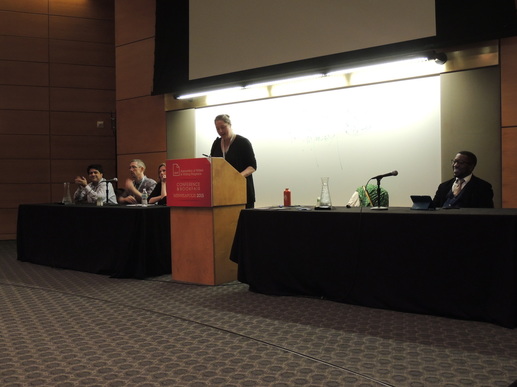 The "Publishing Sucks" panel - AWP Conference 2015 The "Publishing Sucks" panel - AWP Conference 2015 “Publishing sucks—even when you’re good at it,” read the blurb for this panel at #AWP15, the writing conference I’m attending in Minneapolis. Every writer and artist I know drags around the dead reedy bird of rejection. It’s when we feel unworthy. We devote our lives to an art and craft, and sometimes we wonder if it’s worth it. Thus, this panel was held in one of the larger halls, and still people had to sit on the steep carpeted stairs to fit in. I pictured each person ready to grab a torn battle flag fallen to the ground and jam it proudly aloft. We’re still alive. As the moderator, Jill McDonough, said, she couldn’t help feel a shadow cross her heart when she passed the Paris Review booth at AWP. “Curse you, Paris Review! You could have published me,” I could imagine her yelling. How many of us could warm ourselves through a winter burning rejection slips? None of us return the favor, though. “I’m sorry, Tin House. Your journal doesn’t meet my needs at this time.” I’ve been on the other side, however, as the senior editor at a small publishing house, the late Prelude Press. We published computer books, yet we received manuscripts for novels, self-help books, and children’s picture books, among others. We did not seek such things. Still, the heavy entries came, often with a poorly written cover letter such as, “This here picture book my nephews loved. It will make you lots of munny. How much munny will you give me now?” At Prelude, the worst and funniest query letters went on the employee refrigerator. We’d grab our bag lunch and laugh. Ever since, my goal has been not to end up on any publisher’s refrigerator. The panelists for this event included poets Kimberly Johnson, Major Jackson, Jay Hopler, and novelist Brando Skyhorse. They each had their war stories, such as Hopler once interned in college for a major journal, and his job was simply to put the rejection slips in the 10,000 submissions that needed attending to. He was told not to read any of the poems because there weren’t enough hours in the day. “Just make sure you don’t include their cover letters back. They really hate that,” he was told. Thus, it was an exercise in mailing. (Didn’t you ever wonder if some places did that? Zyzyva seemed to send me a rejection faster than I could return from the post office.) Rather than dwell on how tough and difficult publishing is, the panelists offered practical things people could do. One of the major themes was, “There’s no replacement for a really good editor.” If you’re serious about a manuscript, hire an editor to help you before sending it anywhere. I’ve found that true. While I’m a strong editor, I can’t be objective about my own work. I hire an editor. Major Jackson, poetry editor for The Harvard Review, mentioned he hated cover letters that oversold the writer by listing publications. He could care less how much you’ve been published. He wants a short letter. If you mention a poem you liked from a previous edition, that would tell him more than your publications. He also felt that “most of publishing is luck. The joy should be in the writing.” He later added, “Seventy-five percent of what you do should be the writing. The rest is building an audience.” Brando Skyhorse said he’d been in the UC Irvine writing program with Alice Seybold and Aimee Bender, two writers who became quite successful after graduating. In fact of the seven in his class, six got published quickly—everyone but him. It took him thirteen years. In the meantime, he worked as an editor for a large publisher, and had to reject people. The work sharpened his sense of quality, helpful now as a writer. It occurred to me that while many writers aim for and seek a large publisher, when they get frustrated, they decide to do it themselves and self-publish. While it’s a valid choice, there’s a middle ground—the small publisher. A hundred yards from where the panel was held, the AWP annual Bookfair buzzed with attendees. Among the nearly 800 booths and tables stood an array of small publishers willing to talk with anyone. Many featured their head editor. I talked to many this time knowing I’d be writing this. I discovered something I never knew. Most small publishers make little to no money. Some are non-profit companies. They all do it for the love of discovering great new work. They take pride in the quality of their publications. While a small publisher will never have the marketing muscle of a larger one, plenty of authors get little to no marketing help with a large publisher. Large or small, you get the cachet of being published. As I wrote in yesterday’s post about real writers and publishers, you’ll have to do much of the marketing yourself anyway. If you click here, you can get the list of exhibitors from this year’s Bookfair. You can look up their submission policy online. Consider coming to next year’s AWP conference in Los Angeles. Perhaps you’ll have finished your new manuscript by then. Any writer can join the AWP. It can be lonely as a writer, yet when you are among many others, you feel a sense of community. When you hear someone really great at a reading as I did yesterday with Susan Straight, Ron Carlson, and T.C. Boyle, you are energized. Brando Skyhorse ended the discussion with, “Publishing sucks, but writing doesn’t. Good work always finds a way…eventually. How long are you willing to wait for eventually?” I’ll add, what are you willing to do differently to get published? Hire an editor? Write another book? If you have suggestions or your own publishing war stories, feel free to add a comment. 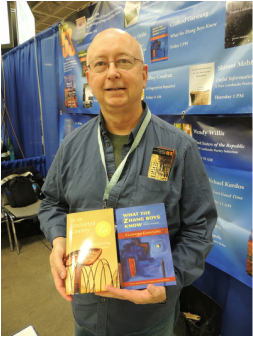 Author Clifford Garstang Author Clifford Garstang “The bookstore is the worst place for books,” said publisher Kevin Watson. “Bookstores are killing small publishers.” It’s Day One of the Association of Writers and Writing Programs (AWP) Conference in Minneapolis—and it’s snowing. It’s April, and it’s snowing. Yet I feel hot from all I’ve learned in a day, including from Kevin Watson. He gave me insight on how the bulk of authors and small publishers make it today in America. With my small company, White Whisker Books, competing in the marketplace, I became all ears. Before I’d met him, I’d attended four panels, three of which dealt with trauma and/or war—popular subjects at this conference. With all that misery on my mind, I needed chocolate, and the Bookfair was a great place for that. The AWP Conference can be divided into two main parts. Many people come for the 75-minute panels that focus on writing craft and publishing—over 500 offered over three days in a conference center the size of Dallas. There’s something for everyone. The Bookfair offers endless rows of booths, mostly small publishers, spread out over a space larger than a football field. I found chocolate at Press 53, a small publisher out of North Carolina, run by Kevin Watson. “Bookstores, are you kidding me?” said Watson. “How does your press make money, then?” I asked. “Small publishers can’t make money at bookstores,” he said. “The returns kill you.” I learned that myself with the latest book White Whisker published. The reviews were great—and the returns even larger. We’ve paid more money in returns than earned. “Bookstores are also not great for authors,” said Watson. “If you’re a new author, do you really think a reader, scanning among the thousands of books at a bookstore, will come across yours?” Rather, authors need to be good at finding places to give a reading, and they’ll have an audience who then will buy the book. “I sell authors their books at half of retail price,” said Watson. “They sell their books at full price. Thus, they get 50%--much more than the 10% royalty they’d otherwise get. I make a little money too, multiplied by my many authors. It’s win/win.” Thus, when he takes an author on, he needs to know they are driven to find places to read, such as bookstores, libraries, coffee shops, art galleries, and with various groups, such as book clubs. I then met one of Watson’s authors, fiction writer Clifford Garstang, whose new book of short fiction, What the Zhang Boys Know, won a writing award by the State of Virginia. Garstang explained that he sends his books to contests, which is a great way to get a book publicity if it wins. “Join contests?” I said. “Yep. You can’t be shy.” That reminded me of the first panel I attended today, “Social Media for Authors.” I learned from panelists Meghan Ward, Amy King, Susan Ito, Issac Fitzgerald, and Sophfronia Scott a few truths: · It’s more important to have fans rather than followers. · Social media is like a party. You don’t walk into a party where you don’t know people, hold up your book, and say, “Buy this thing.” Rather, you converse. If people like you, they’ll find your books. · You have to find the enjoyment of social media, rather than see it as a responsibility. Most people now use Facebook with real friends. If you have an author’s page on Facebook, then spend the money to boost your post. Facebook needs to make money while you make money. · Do your posts help other people or make them laugh? You need to connect to people. · Share your flaws. Don’t come across as having the perfect life, but offer some of your challenges—even ask for help. · Be reciprocal. Respond to other people’s posts. Many authors have the old-fashioned notion that publishers will give them a big advance, spend millions on publicity—get them on the Today show or whatever—and money will pour in after all that hard work in writing. The truth is, you need to be an entrepreneur and find good ways to hawk your book. You’ll have the cachet of being published, but from there, you have to find your audience. If you’re enthusiastic about your work, then it should fall into place. Or take this another way: keep your expectations low, and just try new things. Writer Anne Lamott just posted on her Facebook page a great truth about publication: "Just try to bust yourself gently of the fantasy that publication will heal you, will fill the Swiss cheesey holes. It won't, it can't. But writing can. So can singing." |
AuthorBefore I wrote novels and plays, I was a journalist and reviewer (plays and books). I blogged on Red Room for five years before moving here. CategoriesArchives
July 2023
|
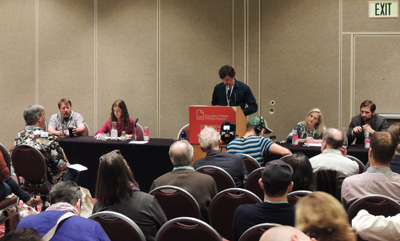
 RSS Feed
RSS Feed
